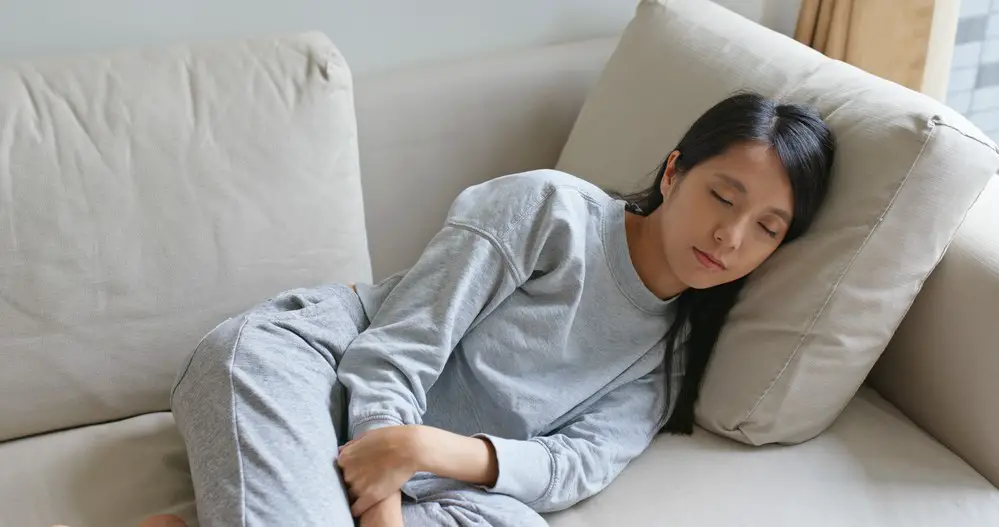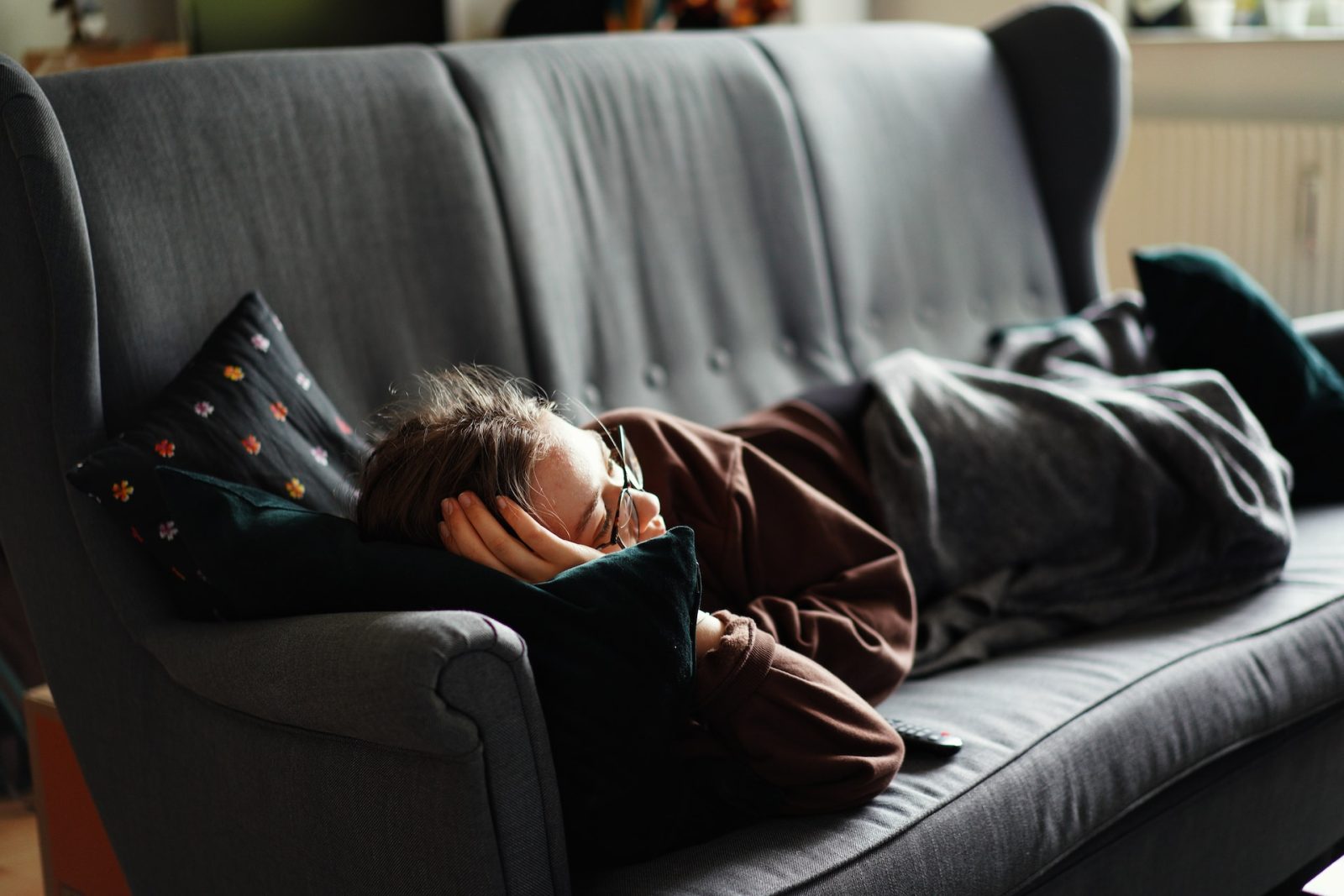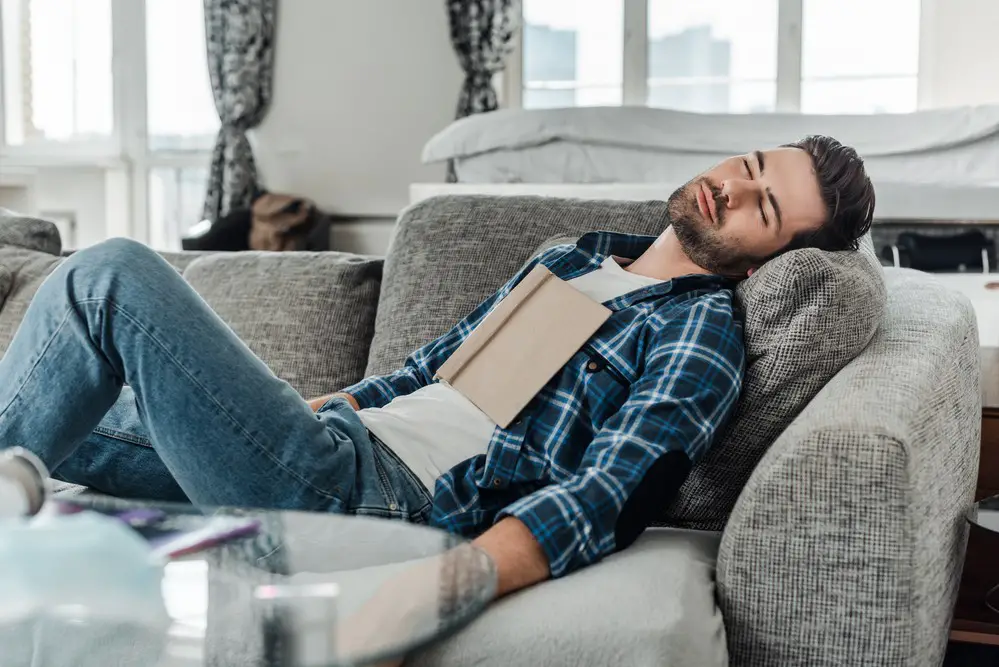As a BetterHelp affiliate, we receive compensation from BetterHelp if you purchase products or services through the links provided
Many people struggle to get a good night’s sleep in their beds, yet they report experiencing a deep and restful slumber when they sleep on the couch. This phenomenon may initially seem counterintuitive, as we generally associate the couch with daytime activities and relaxation rather than sleep. However, multiple factors might explain why some individuals consistently sleep better on their couches than in their beds.
Psychological factors play a significant role, as the couch often represents a comforting and non-stressful environment, which may facilitate relaxation and sleep onset. Additionally, physical elements such as the couch’s softness or firmness and its distinct shape compared to a traditional bed can contribute to a more comfortable and customized sleeping experience. Environmental factors, including temperature, light, and noise, can also influence sleep quality, and some people may find these aspects more favorable while sleeping on the couch.
Key Takeaways
- Psychological factors and the comforting environment of the couch might contribute to better sleep.
- Physical elements such as the couch’s distinct shape and firmness can impact sleep quality.
- Environmental factors, including temperature, light, and noise, may be more favorable on the couch.

Psychological Factors
Various psychological factors greatly influence sleep. One such factor is habit. If a person has been regularly sleeping on the couch, their brain could associate the couch with sleep, leading to a better quality of sleep on the couch compared to the bed.
Relaxation is another key psychological factor in determining sleep quality. Many individuals find their living room more relaxed because they often unwind after a long day or watch TV. This association with relaxation could make the couch more conducive to sleep.
The proximity to electronics and screens can also affect a person’s sleep quality. Screens emit blue light, which can disrupt the production of melatonin – a hormone responsible for regulating the sleep-wake cycle. While using electronics in the living room might not be ideal, the absence of screens in the bedroom can lead to a lack of mental stimulation, making it difficult to fall asleep.
Anxiety can significantly impact sleep, and scenery changes might help alleviate anxiety for some individuals. People suffering from anxiety might find comfort in sleeping on the couch because it offers a change of scenery from the bedroom. This change can help the brain disassociate from the negative feelings tied to the bedroom, thus improving sleep.
In conclusion, several psychological factors can contribute to an individual’s preference for sleeping on the couch rather than in bed. The influence of habit, relaxation, proximity to electronics, anxiety, and the need for a change of scenery can all play a role in determining where a person sleeps best.
Physical Elements
The physical elements of sleeping on a couch can directly impact the quality of one’s sleep. A few aspects to consider include the pillow, mattress, and sleeping position.
The type of pillow one uses on a couch can contribute to better sleep. A pillow that provides proper neck support can significantly reduce neck pain. On a couch, it is often easier to find a comfortable position without straining the neck than a bed.
Regarding the mattress, a firm surface can improve spinal alignment, helping reduce back pain and ensuring a more comfortable sleep. Couches can sometimes provide a firmer, more consistent surface than some mattresses, which can be too soft or have worn-out springs. As a result, sleeping on a couch can help maintain better spinal alignment.
Sleeping position is another essential factor to consider for quality sleep. On a couch, individuals are usually less likely to switch positions during the night, which can be beneficial for maintaining a neutral spine. The limited space available on a couch can also promote better spinal alignment, as it might prevent people from twisting their spine or adopting unnatural sleeping positions.
In conclusion, the physical elements of sleeping on a couch, such as a pillow, mattress, and sleeping position, can contribute to a better night’s sleep. A firm surface and proper neck support can help alleviate back and neck pain, while the limited space may encourage healthier sleeping positions for improved spinal alignment.
Sleep Quality and Disorders
Sleep quality is essential for maintaining overall health and well-being. Various factors can determine the quality of one’s sleep, such as circadian rhythm, melatonin levels, and sleep hygiene. Some people may find better sleep on a couch, improving sleep quality.
Circadian rhythm is the body’s internal clock that regulates sleep-wake cycles. Melatonin, a hormone produced in the brain, regulates this rhythm. It is essential for achieving good sleep, as it helps signal the body when to fall asleep and wake up. Sleep hygiene refers to the habits and practices that contribute to better sleep. Good sleep hygiene includes maintaining a consistent sleep schedule, creating a comfortable sleep environment, and avoiding stimulating activities before bedtime.
Sleep disorders such as insomnia and sleep apnea can affect sleep quality. Insomnia is the inability to fall or stay asleep, resulting in poor sleep quality and daytime fatigue. Various factors, such as stress, anxiety, or poor sleep hygiene, can cause it. Sleep apnea is a disorder characterized by interruptions in breathing during sleep, specifically obstructive sleep apnea (OSA). OSA occurs when the muscles in the throat relax, blocking the airway and causing brief pauses in breathing. This can lead to multiple awakenings at night, leaving the individual tired during the day.
For some individuals, sleeping on a couch may provide better sleep due to its firmness or elevation. A firmer surface can help alleviate pressure on the airways, which may benefit those with sleep apnea. Additionally, the couch’s elevation may help reduce symptoms of acid reflux, which can disrupt the sleep cycle. Furthermore, a change in sleeping location might help break habits associated with poor sleep hygiene, such as using electronic devices in bed or having an irregular sleep schedule.
In conclusion, sleep quality is crucial for overall health and well-being. Factors like circadian rhythm, melatonin, and sleep hygiene can significantly affect sleep quality. Sleeping on a couch might help some individuals improve their sleep quality due to its firmness, elevation, and the potential to break poor sleep habits. However, it is crucial to consider individual requirements and consult a healthcare professional before significantly changing one’s sleep routine.

Health Conditions Related to Couch Sleeping
Sleeping on the couch can sometimes relieve individuals suffering from certain health conditions. For example, those experiencing cold, flu, or congestion might find the slightly elevated position of the head while resting on a couch more comfortable. This elevation can help relieve pressure on the sinuses and promote easier breathing.
Acid reflux is another condition that can improve with couch sleeping, as it typically worsens when lying flat. The inclined posture of the couch can help prevent stomach acid from flowing back into the esophagus, reducing heartburn and discomfort.
However, those with orthostatic hypotension should be cautious when sleeping on the couch. Orthostatic hypotension is a sudden drop in blood pressure when standing up after sitting or lying down. The transition from lying on a couch to standing might exacerbate this condition, leading to dizziness or fainting.
In summary, couch sleeping can offer temporary relief for certain health conditions. It is important to consider individual circumstances and consult a medical professional if symptoms persist or worsen.
Environmental Factors
Creating a soothing sleep environment is crucial to sleeping better. For some individuals, the couch offers a more comfortable and relaxing setting than the bedroom, which can lead to improved sleep quality.
Elements like white noise can be conducive to sleep in some sleeping environments. White noise is produced when various sound frequencies combine, creating a soft, gentle hum that helps individuals relax. On the couch, people may be exposed to white noise from appliances or nature outside, making the sleep experience more enjoyable.
Another factor in creating the right sleep environment is the bedtime routine. Establishing a consistent routine that involves unwinding and engaging in relaxing activities before sleep is essential. For some people, these activities may be more comfortable on the couch than in bed. It could be reading a book or listening to calming music on the couch, which sets a more tranquil sleep atmosphere.
Television and electronic devices emit blue light, which can disrupt sleep patterns by suppressing the production of the sleep hormone melatonin. However, some individuals find that the blue light emitted from the TV or their electronic devices minimizes their ability to fall asleep on the couch. This situation varies from person to person, but it can be a helpful sleep environment for those who can sleep better on the couch with minimal blue light exposure.
Finally, the sleeping environment itself must be comfortable and supportive. Ensuring that the couch has enough cushioning and is spacious enough for a good night’s rest is critical for those who sleep better on the couch. Additionally, the right amount of blankets, pillows, and a suitable room temperature can improve sleep quality on the couch, providing a satisfying sleep environment.
In conclusion, environmental factors significantly determine which sleep setting is best for different individuals. Many people find the couch a more comfortable and beneficial sleep environment, offering a balance of white noise, relaxation, minimal blue light exposure, and supportive sleep conditions.
Social Situations and Relationships
Regarding sleeping better on the couch, one significant factor may be social situations and relationships. People in relationships, especially ones involving sex, could experience an inability to bed share or difficulty co-sleeping with their partner. Their partner’s movements, sounds, or presence can cause discomfort, leading to a restless night.
In some cases, individuals find that sleeping separately from their partner provides better sleep quality. A difference in sleep schedules, work shifts, or even preferences in sleep environment might be a reason to opt for the couch instead. Both partners can have a more restful night and maintain a healthier relationship by choosing an alternative sleep location, such as the couch.
Additionally, co-sleeping with infants can also contribute to disrupted sleep for parents. Sharing a bed with a baby might lead to more frequent awakenings due to the infant’s sleep patterns and needs during the night. Parents might find solace on the couch to gain some much-needed rest.
In conclusion, social situations and relationships can be crucial in why individuals might find better sleep on the couch. Considering the diverse sleeping needs and preferences of relationship partners and co-sleeping infants, opting for alternative sleeping arrangements, like the couch, can improve sleep quality and overall health for everyone involved.
Possible Drawbacks of Sleeping on the Couch
While sleeping on the couch may seem like a solution for those experiencing sleep problems, it has its fair share of drawbacks. One of the main issues is the limited space available on most couches. This could mean an uncomfortable sleeping position, leading to muscle pain and stiffness the next day.
Another concern is the accumulation of germs on the couch, frequently used for sitting. Close contact during sleep increases the risk of exposure to allergens, bacteria, and viruses, which might negatively impact one’s overall health.
A nearby TV while sleeping on the couch hinders effective rest for some people. Staying up late watching shows may be tempting, leading to insufficient sleep and affecting overall performance during the day.
In summary, while sleeping on the couch can seem like an appealing alternative, it presents several drawbacks that outweigh the potential benefits. It is important to consider these factors before making the couch a regular sleep location.
How to Get Better Sleep on the Couch
Sleeping on the couch can sometimes lead to better rest for people who have trouble falling asleep or experience snoring. Consider the following tips to ensure quality sleep on the couch.
Firstly, remove any excessive or unnecessary cushions and pillows from the couch. This is essential to creating a comfortable and supportive sleeping surface. Lay a clean, fitted sheet over the couch to promote a more hygienic and restful environment.
Secondly, choose a supportive pillow that aligns with the natural curve of your neck and shoulders. This can reduce muscle tension and help with snoring. Furthermore, placing a smaller pillow beneath your knees can alleviate strain on your lower back.
Maintaining a consistent sleep schedule is another important aspect of getting better on the couch. Aim to go to bed and wake up at the same time every day, even on weekends. This will help regulate your body’s internal clock, leading to a more consistent sleep pattern.
Temperature also plays a crucial role in the quality of sleep. Adjust the room’s thermostat or use a fan if necessary to maintain a temperature between 60-67 degrees Fahrenheit (15-19 degrees Celsius), which is considered optimal for sleeping.
Some potential benefits of sleeping on the couch include:
- Easier to fall asleep due to the change of environment.
- Reduced snoring, as the elevated position may help keep airways open.
- Enhanced comfort for those who prefer firmer surfaces.
Lastly, create a relaxing and tranquil atmosphere in your living room. Invest in blackout curtains to minimize light exposure, use soft lighting sources to create a soothing ambiance, and consider incorporating white noise machines or calming music to drown out disruptive sounds.
By applying these tips, you may find it possible to optimize your sleep quality and enjoy the benefits of sleeping on the couch.
Conclusion
People often sleep better on a couch due to a combination of factors. Primarily, the couch provides comfort and security with its enveloping design and familiar surroundings. Additionally, sleeping on a couch may represent a break from the usual routine, thus reducing stress and promoting relaxation.
Moreover, certain physical aspects of a couch may contribute to better sleep. A firmer surface can help maintain proper spine alignment, benefiting those with back or neck pain. Furthermore, the couch’s size and shape may encourage more favorable sleeping positions, such as lying on one’s back or side, which can reduce the risks of sleep apnea and snoring.
While the reasons for sleeping better on a couch may vary, individuals must prioritize their sleep quality and assess which sleeping environment works best for them. Sometimes, making minor adjustments to their bedroom setup – such as investing in a firmer mattress, optimizing lighting, or adjusting room temperature – might be sufficient to improve sleep. In other cases, consulting with a medical professional or sleep specialist may be more appropriate to address underlying sleep disorders or health concerns.
In conclusion, the reasons one may sleep better on a couch are multifaceted and ultimately depend on personal preferences and circumstances. By prioritizing sleep and finding the ideal environment for restful slumber, individuals can experience quality sleep’s various health and well-being benefits.
Frequently Asked Questions
Why is couch sleeping more comfortable?
Some individuals find couch sleeping more comfortable due to its sense of security and enclosure. Additionally, the material and cushioning of the couch may differ greatly from that of a conventional bed, and people may prefer the unique feel. It can also be due to personal preferences and habits.
Does the sofa provide better sleep for some?
Yes, the sofa can provide better sleep for some people. It may be attributed to a person’s routine or mere personal preference. Some individuals might find the couch more soothing and relaxing, enabling them to fall asleep more quickly.
What factors may lead to sleeping better on the couch?
Factors leading to better sleep on the couch may include the feeling of security, a person’s sleeping position, ambient noise levels, and firmness of the couch cushion. Furthermore, stress relief and a cozy atmosphere also promote better sleep on the couch.
Can sleeping on the couch cause back pain?
Yes, sleeping on the couch can cause back pain, especially if it’s done habitually. Couches typically lack the proper support for the spine compared to a mattress specifically designed for sleeping. Prolonged couch sleeping can lead to poor spinal alignment, causing discomfort and pain.
How can couch sleeping impact relationships?
Couch sleeping can affect relationships by creating a physical distance between partners, which may lead to communication barriers and feelings of isolation. Couples must address the causes behind couch sleeping and work together to find solutions that accommodate both parties needs.
Does daily couch sleeping damage the sofa?
Daily couch sleeping can potentially damage the sofa. Continuous use may lead to a saggy, lumpy appearance, and it’s likely to wear out the cushions faster. Damages to the upholstery and frame may also occur, reducing the lifespan of the couch.
- 3 Ways Wearing a Hat Can Help Lower Your Stress Levels - April 19, 2025
- Breaking the Silence: Why Men’s Mental Health Matters More Than Ever - April 15, 2025
- How to Transform a Home’s Patio Space into a Relaxing Space - March 23, 2025
This site contains affiliate links to products. We will receive a commission for purchases made through these links.



